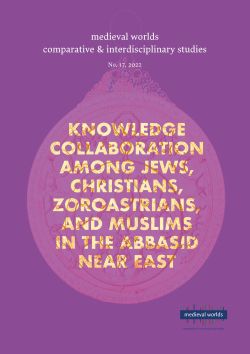 |
 |
Walter POHL – Andre GINGRICH (Eds.) - Nathan Gibson (Guest Ed.)
medieval worlds • no. 17 • 2022
Nathan P. Gibson
S. 59 - 72 doi: 10.1553/medievalworlds_no17_2022s59
Verlag der Österreichischen Akademie der Wissenschaften doi: 10.1553/medievalworlds_no17_2022s59
Abstract:
This thematic section unearths several ways professionals from a variety of religious communities in the Near East collaborated with one another during the medieval period. Modern scholars of intellectual history have often attempted to trace connections in medieval texts across the religious spectrum, but it has been difficult to pin down the interpersonal circumstances behind these and other interactions. This is at least in part because scientific, philosophical, and theological treatises rarely refer to these personal relationships explicitly, leaving researchers to turn to other kinds of works for such details: biographies, chronicles, hagiographies, and documentary sources. But it then remains to come to terms with the historiographical perspectives of the authors of these works. For example, the authors of Arabic biographical dictionaries (ṭabaqāt literature) have provided some of the richest sources for person-to-person exchange in Near Eastern intellectual history, but they filter and taxonomize their subjects to focus on individuals, overwhelmingly men, who can be seen as formative for particular classes or categories (ṭabaqāt) of society. Disciplinary segmentation has made it especially difficult to answer questions such as how much »neutral« space there was in interreligious knowledge exchange in the Near East, or whether fields such as medicine became »Islamicized« through the exclusion of non-Muslims in the teaching, study, or practice of the field. The authors of the research articles here (contributors to a virtual forum hosted by the BMBF-funded »Communities of Knowledge« project) take various approaches to these problems of explicating silent sources, interpreting historiographical constructions, and bridging disciplinary segmentation. Some put particular texts under the microscope, pointing out new evidence of specific interactions on the basis of close readings or the examination of texts in a palimpsested manuscript. Some zoom out slightly on these interactions by making fresh comparisons between sources in differing genres or languages. All focus on the interreligious dimensions of exchange and, wherever possible, on the interpersonal engagements that brought these about. Reports from two research projects complement these by taking macro-level approaches that involve multiple languages, several genres, and broad regions. Overall, this thematic collection highlights the interpersonal and collaborative aspects of work by Jews, Christians, Zoroastrians, and Muslims during the Abbasid caliphate (132-656 AH/750-1258 CE) with the aim of stimulating new research approaches that overcome previous genre limitations and disciplinary boundaries.
Near East/Middle East, knowledge production, interreligious exchange, Abrahamic religions, medieval science, medieval medicine, biographical literature, Abbasid caliphate (132-656 AH/750-1258 CE), Arabic, Syriac Published Online:
2022/11/30 12:58:11 Object Identifier:
0xc1aa5576 0x003ddac8
Rights:https://creativecommons.org/licenses/by-nc-nd/4.0/
medieval worlds provides a forum for comparative, interdisciplinary and transcultural studies of the Middle Ages. Its aim is to overcome disciplinary boundaries, regional limits and national research traditions in Medieval Studies, to open up new spaces for discussion, and to help developing global perspectives. We focus on the period from c. 400 to 1500 CE but do not stick to rigid periodization.
medieval worlds is open to submissions of broadly comparative studies and matters of global interest, whether in single articles, companion papers, smaller clusters, or special issues on a subject of global/comparative history. We particularly invite studies of wide-ranging connectivity or comparison between different world regions.
Apart from research articles, medieval worlds publishes ongoing debates and project and conference reports on comparative medieval research.
Editorial
Ingrid Hartl and Walter Pohl
»The sun was darkened for seventeen days« (AD 797).
An Interdisciplinary Exploration of Celestial Phenomena between Byzantium, Charlemagne, and a Volcanic Eruption
Johannes Preiser-Kapeller and Ewald Kislinger
Knowledge Collaboration among Jews, Christians, Zoroastrians, and Muslims in the Abbasid Near East
Guest editor: Nathan Gibson
Knowledge Collaboration among Jews, Christians, Zoroastrians, and Muslims in the Abbasid Near East: Introduction
Nathan P. Gibson
Why Muslims Shouldn’t Practice Medicine. The Autobiographical Account of a Frustrated Physician, Ibrahīm al-Qalyūbī (fl. second half 7th/13th)
Ignacio Sánchez
Alī and “Sons of Ādurbādh”: Zoroastrians Priests in the Early Islamic Era
Kayla Dang
On Attributes and Hypostases: Muslim Theology in the Interreligious Writings of Patriarch Timothy I (d. 823)
Joachim Jakob
For the Care of Body and Soul: The Greek Bible and an Arab-Islamic Botanical Text in a 10th-Century Palimpsest Fragment
Matteo Pimpinelli
Interreligious Scholarly Collaboration in Ibn al-Nadīm’s Fihrist
Rémy Gareil
Project Reports
Indexing A Shared Knowledge Culture from Many Perspectives: The Historical Index of the Medieval Middle East (HIMME) as a Tool for Researching Diversity
Thomas A. Carlson and Jessica S. Mutter
Embedding Conquest: Naturalizing Muslim Rule in the Early Islamic Empire (Project Report)
Cecilia Palombo
|




 Home
Home
 Print
Print
 References
References
 Share
Share
